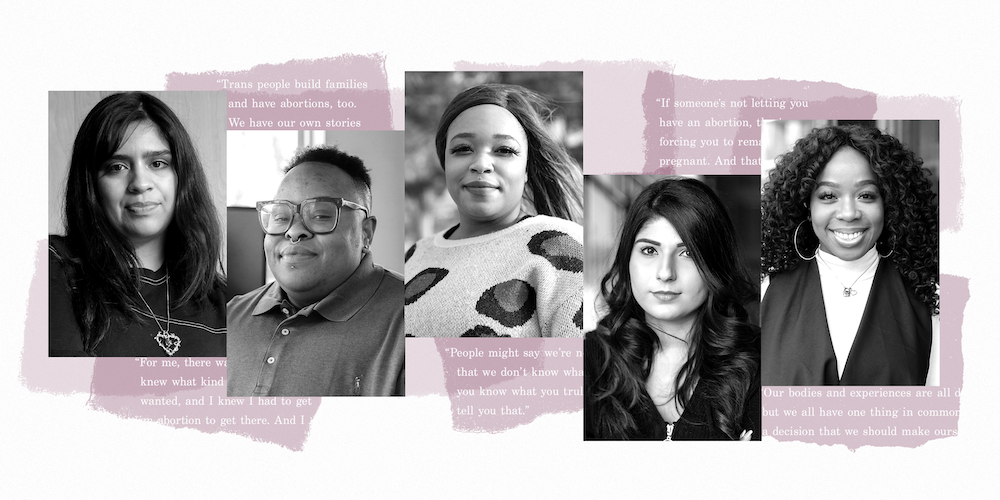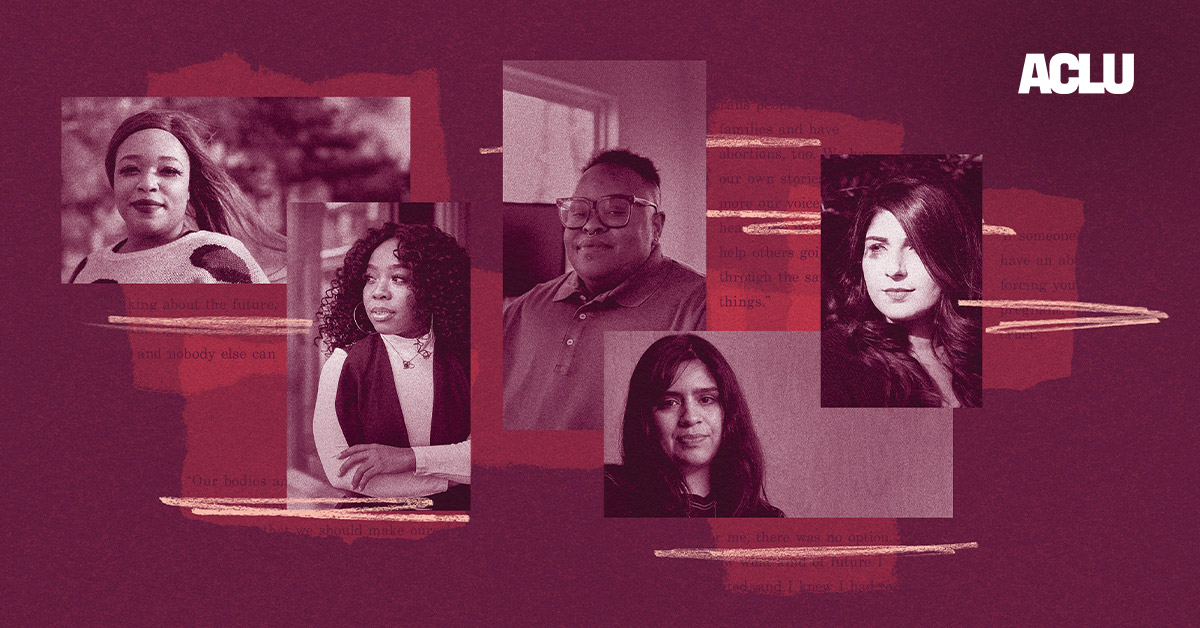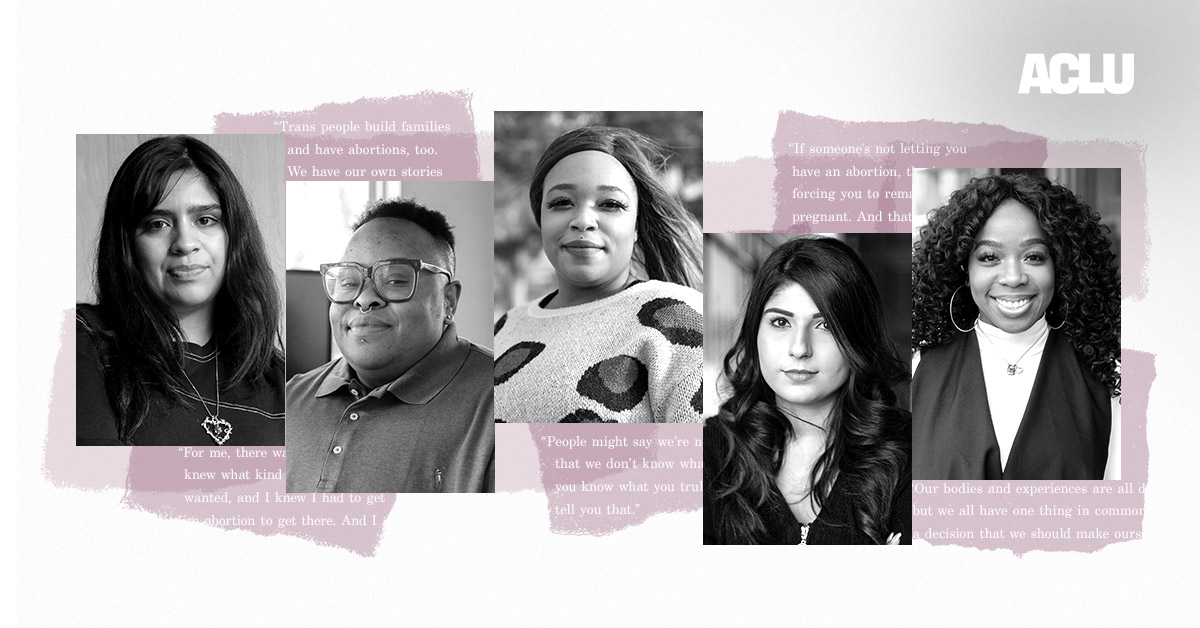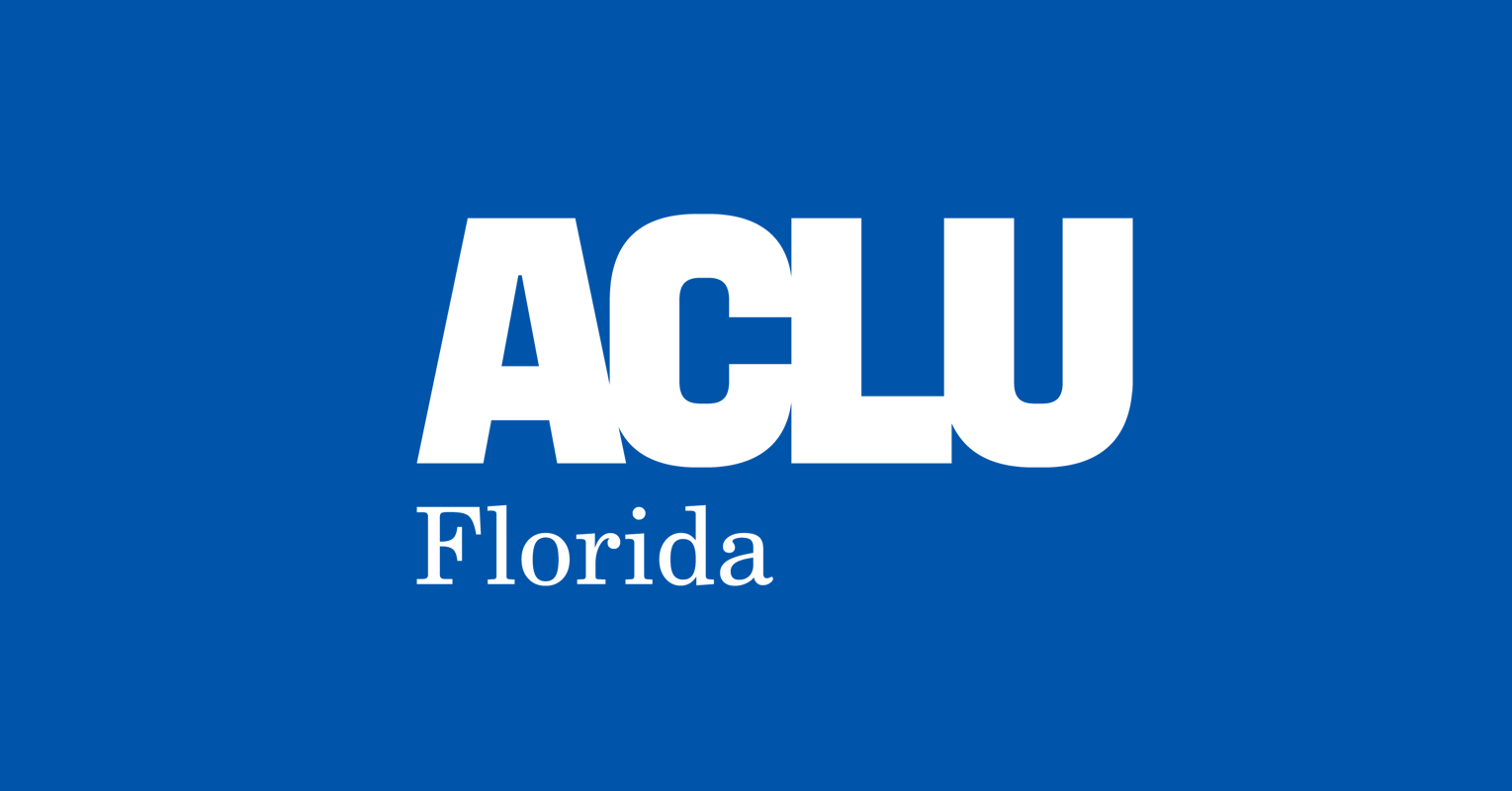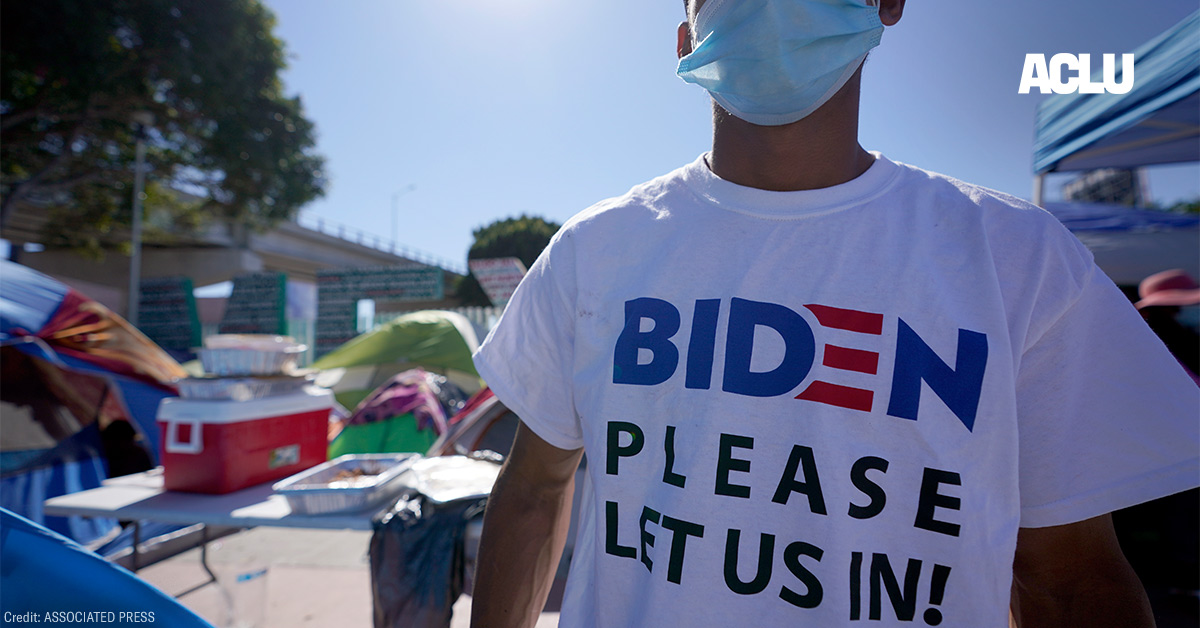The last time we talked to Angel, Briana, Cazembe, Maleeha, and Veronika, abortion was still a constitutional right across the country. It was exactly one year ago, on the 49th anniversary of Roe, amid an unprecedented surge of anti-abortion attacks sweeping through state legislatures in the run-up to the Dobbs decision. As abortion rights activists were gearing up for the decision, more and more people who had abortions were sharing their stories publicly, hoping to lessen the stigma of abortion as a strategy to fight back.
Recently, we revisited five activists we spoke to last year through our partnership with We Testify, an organization dedicated to uplifting these voices, about what their work looks like in a post-Roe world and how storytelling continues to change minds and break through the politicization of essential reproductive health care. Here’s what they told us one year later, on what would have been the 50th anniversary of Roe.
These conversations have been edited and condensed for clarity.
On the moment the news broke about Roe v. Wade being overturned
CAZEMBE: There was a feeling of devastation, a little like, what would I do, had there not been an opportunity for me to be able to get an abortion when I needed one? I immediately started thinking about the people who had appointments that were worried about whether or not they would be able to make decisions for their bodies.
It made me worry because I’m also a queer and trans person and there was a part of the decision where Clarence Thomas talks about basically taking away the rights of same sex couples to be married, and also the use of contraceptives. It was not something I was expecting.
MALEEHA: I was dropping my daughter off at school and on my way back, my cousin texted me about it. I saw it, but I couldn’t really process it because I was driving … I went back home, parked in my garage, and just sat in my car for 30 minutes trying to let the news sink in … It really happened. Roe was overturned. We’re living this terrible reality. This is it.
BRIANA: Someone sent me an email or a social media post and they were just like, “Oh, I’m just checking on you.” And at that point I was doing some self-care, so I wasn’t really trying to be on social media like that. So I was just like, what are they checking on me for, that’s weird. And then when I got an email from work, I was like, whoa. Now it all makes sense.
ANGEL: I was devastated when I found out. At the same time, I wasn’t surprised, just being from Texas. Before the decision, I was hoping for the best, but preparing for the worst.
VERONIKA: Organizations in Texas such as the one I work for, Jane’s Due Process, had been dealing with a post-Roe reality since SB 8. And so we knew what to expect … we knew that the first thing that was going to happen was trigger laws coming into effect. And that’s exactly what happened.
On storytelling as an act of resistance
CAZEMBE: I think in a post-Roe world, storytelling is even more important … We need way more people to be talking about abortion because we need to normalize it. And I think talking about it takes away the stigma. Audre Lorde said, “Our silence doesn’t protect us.” You can be silent and not talk about abortion, but they’ll still come for you, you’ll still be criminalized, people you love will still not have access to the care that they need.
MALEEHA: I think it’s even more important now that those of us who’ve had abortions and are comfortable sharing our stories, do so. It can help people who might be feeling alone and afraid to find a community, because there are so many of us out there. There are so many people who have abortions for so many reasons, and I’d really like for our voices to be louder than those of the antis. … Just because Texas has banned abortion doesn’t mean people are not having abortions.
VERONIKA: There is a stigma that, “Oh, now since Roe has fallen, and a lot of states ban abortion, then abortion must be wrong.” That stigma is already ingrained in some people’s heads and it makes people think that abortion is a bad thing. And so telling stories adds a really personal touch on a very politicized topic.
BRIANA: We want people to know that there are resources available, and storytelling gets the word out there. Even though Texas Equal Access (TEA) Fund cannot fund abortions in Texas, we still have resources available for you to access. And sometimes, a lot of people don’t understand what you have to go through to get an abortion until storytelling comes into play. So if anything, I feel like now we need storytellers more than ever.
ANGEL: Being a storyteller was important before, but it’s more important now that we in Texas don’t have that option. Sharing your story with others makes them feel better about whether they’ve had an abortion before or not, or if they are seeking abortion, that there’s so many women out there that could be your friend, your sister, your mom, your cousin, anybody, your teacher that has also had an abortion.
On changing hearts and minds through conversation
MALEEHA: There are a lot of people that are on the fence. … For me, I want to focus on that middle ground because once they hear the stories of so many different people, it is absolutely possible to change minds and change hearts.
BRIANA: There have been plenty of conversations that I’ve had about my own story, when I’ve been talking to someone and they were like, “Oh, I didn’t think about that. Oh, I wouldn’t expect you to get an abortion.” I feel like if you can just change the mind of one person with storytelling, you’ve done something.
VERONIKA: I definitely think it’s still possible, when people explain how abortion actually helped them in their lives, like how it did with me. I was 17 and was looking forward to college, and if I hadn’t had an abortion, then I wouldn’t have been able to go to college because I had no money, no job, or anything. When you share that aspect, you show how it impacts people’s lives until way later. For me, it’s been about five years and it’s still one of the best decisions I’ve ever made, and it’s something that I don’t regret. I still feel that sharing your story can be really impactful because it’s a conversation that can change people’s minds little by little.
On keeping up the fight for abortion access
BRIANA: I think the morale is probably different for everyone. We are trying to be as optimistic as possible … You know, it’s very disheartening that we’re in this position. But at the same time, we are finding ways to readjust and try to figure out ways to still support people who are trying to access abortion. So I feel like as long as we think positive and stay optimistic, we’re still going to be able to be in this fight. You know, we’re doing this together. And we have a very large community. So I feel really good about being in this space.
Within TEA fund and I’m sure in many other organizations, we are trying our best to make sure our mental health is okay and that we are supporting each other. Because as we continue this fight, we want to make sure we take care of ourselves so we can help other people. This work is already hard.
MALEEHA: For me personally, it depends on the day you ask me. Some days I’m not feeling so great. With state legislative session coming up, they’re not just trying to attack abortion — they’re trying to attack all of the values that we care about. But we’re trying to remain optimistic and focus on our other reproductive justice values while still holding onto hope. People who are pregnant in Texas now need help more than ever because they are being abandoned by the state and anti-choice politicians.
CAZEMBE: I think activism is evolving post Roe. There are a lot of trainings for folks to become abortion doulas, to assist people getting abortions, raise money, drive them to clinics, take care of them after they had the abortions. … I think we’re fired up. … During the midterms, we saw people show up in record numbers to be able to say this. I know we did here in Georgia because we had a fight between a pro-abortion person and an anti-abortion person fighting for a Senate seat. And the person that was pro-abortion was also the one who ultimately won.
What I’ve heard from other non-binary folks is that folks want to get trained to be able to assist other trans and non-binary folks in getting their abortions, like by doing abortion doula trainings so we can take care of each other. Part of the training is talking to the people at the clinic and saying “Hey, this is what his pronouns are, this is what their pronouns are, and please use them when you refer to him.” And it’s a much better experience than having to advocate for yourself, when you have someone else there who can advocate for you.
VERONIKA: At Jane’s Due Process, our goal right now is to figure out how we can provide since we can’t really do the services that we were intended to do. And that means providing birth control or emergency contraceptives or just getting people well informed. I think all of us are ready to continue the fight
On the idea of reproductive justice for all
CAZEMBE: At the end of the day, we can’t just focus on abortion because even if we get abortion access, we still have patriarchy, we still have racism, we still have all these other systems in place that will keep abortion access limited to a specific few. So we have to continue to fight for all of these other systems of oppression to be abolished as well. For example, when we think about abolition of the police, in order for us to do that, we need to be able to protect abortion access because there are people who are being criminalized for wanting to end their pregnancies.
BRIANA: I feel like you can go on and on about what reproductive justice could mean, but at least for me, it’s making sure that people don’t have to go through all these financial barriers. I went through a lot of abortion stigma when I tried to access my abortion, so I wish a lot of people did not have to go through that. I wish people would just be a little bit more understanding and let people know, like, again, everyone has abortions and we all have abortions for many different reasons. And I wish that any and everyone can get an abortion for free. Like abortion for everyone. That’s what I would want.
MALEEHA: Reproductive justice to me means not just focusing on abortion, but the full spectrum of care. But it’s also for people who are choosing to be parents or want to be parents to be able to raise their children in safe and sustainable communities, which means paid sick leave, which means parental leave, which means doing something about the ridiculous and rising childcare costs and health care. That to me is reproductive justice.
Watch the full video below:
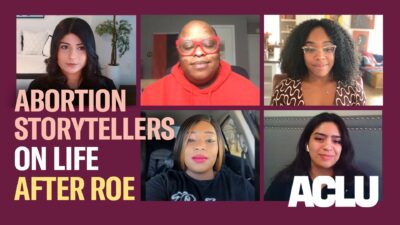
Date
Monday, January 30, 2023 - 5:30pmFeatured image
